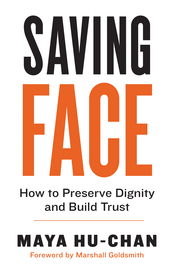Saving Face
How to Preserve Dignity and Build Trust
Maya Hu-Chan (Author)
Publication date: 04/24/2020
“Maya Hu-Chan shares a blueprint for becoming a more empathetic, self-aware, and inclusive leader. Saving Face guides us to consider different perspectives, to think first and speak last, and to respect others above all else.”
—Frances Hesselbein, former CEO, Girl Scouts of the USA, and Presidential Medal of Freedom recipient
Organizations now need to attract, retain, and motivate teams and employees across distance, time zones, and cultural differences. Building authentic and lasting human relations may be the most important calling for leaders in this century. According to management and global leadership specialist Maya Hu-Chan, the concept of “saving face” can help any leader preserve dignity and create more empathetic cross-cultural relationships.
“Face” represents one's self-esteem, self-worth, identity, reputation, status, pride, and dignity. Saving face is often understood as saving someone from embarrassment, but it's also about developing an understanding of the background and motivations of others to discover the unique facets we all possess. Without that understanding, we risk causing others to lose face without even knowing it. Hu-Chan explains saving face through anecdotes and practical tools, such as her BUILD leadership model (Benevolence, Understanding, Interacting, Learning, and Delivery). This book illustrates how we can give face to create positive first impressions, avoid causing others to lose face, and, most importantly, build trust and lasting relationships inside and outside the workplace.
—Frances Hesselbein, former CEO, Girl Scouts of the USA, and Presidential Medal of Freedom recipient
Organizations now need to attract, retain, and motivate teams and employees across distance, time zones, and cultural differences. Building authentic and lasting human relations may be the most important calling for leaders in this century. According to management and global leadership specialist Maya Hu-Chan, the concept of “saving face” can help any leader preserve dignity and create more empathetic cross-cultural relationships.
“Face” represents one's self-esteem, self-worth, identity, reputation, status, pride, and dignity. Saving face is often understood as saving someone from embarrassment, but it's also about developing an understanding of the background and motivations of others to discover the unique facets we all possess. Without that understanding, we risk causing others to lose face without even knowing it. Hu-Chan explains saving face through anecdotes and practical tools, such as her BUILD leadership model (Benevolence, Understanding, Interacting, Learning, and Delivery). This book illustrates how we can give face to create positive first impressions, avoid causing others to lose face, and, most importantly, build trust and lasting relationships inside and outside the workplace.
Formats
Paperback - $17.95 - Members: $16.16
Paperback - $17.95 - Members: $16.16
PDF eBook - $17.95 - Members: $12.57
ePub - $17.95 - Members: $12.57
Find out more about our Bulk Buyer Program
- 10-49: 20% discount
- 50-99: 35% discount
- 100-999: 38% discount
- 1000-1999: 40% discount
- 2000+ Contact ( bookorders@bkpub.com )
Orders of 10+ copies shipping to one address receive free ground shipping
within the U.S. Shipping to separate individual addresses via USPS media mail will be applied a handling fee:
Book Details
Overview
“Maya Hu-Chan shares a blueprint for becoming a more empathetic, self-aware, and inclusive leader. Saving Face guides us to consider different perspectives, to think first and speak last, and to respect others above all else.”
—Frances Hesselbein, former CEO, Girl Scouts of the USA, and Presidential Medal of Freedom recipient
Organizations now need to attract, retain, and motivate teams and employees across distance, time zones, and cultural differences. Building authentic and lasting human relations may be the most important calling for leaders in this century. According to management and global leadership specialist Maya Hu-Chan, the concept of “saving face” can help any leader preserve dignity and create more empathetic cross-cultural relationships.
“Face” represents one's self-esteem, self-worth, identity, reputation, status, pride, and dignity. Saving face is often understood as saving someone from embarrassment, but it's also about developing an understanding of the background and motivations of others to discover the unique facets we all possess. Without that understanding, we risk causing others to lose face without even knowing it. Hu-Chan explains saving face through anecdotes and practical tools, such as her BUILD leadership model (Benevolence, Understanding, Interacting, Learning, and Delivery). This book illustrates how we can give face to create positive first impressions, avoid causing others to lose face, and, most importantly, build trust and lasting relationships inside and outside the workplace.
—Frances Hesselbein, former CEO, Girl Scouts of the USA, and Presidential Medal of Freedom recipient
Organizations now need to attract, retain, and motivate teams and employees across distance, time zones, and cultural differences. Building authentic and lasting human relations may be the most important calling for leaders in this century. According to management and global leadership specialist Maya Hu-Chan, the concept of “saving face” can help any leader preserve dignity and create more empathetic cross-cultural relationships.
“Face” represents one's self-esteem, self-worth, identity, reputation, status, pride, and dignity. Saving face is often understood as saving someone from embarrassment, but it's also about developing an understanding of the background and motivations of others to discover the unique facets we all possess. Without that understanding, we risk causing others to lose face without even knowing it. Hu-Chan explains saving face through anecdotes and practical tools, such as her BUILD leadership model (Benevolence, Understanding, Interacting, Learning, and Delivery). This book illustrates how we can give face to create positive first impressions, avoid causing others to lose face, and, most importantly, build trust and lasting relationships inside and outside the workplace.
About the Author
Excerpt









